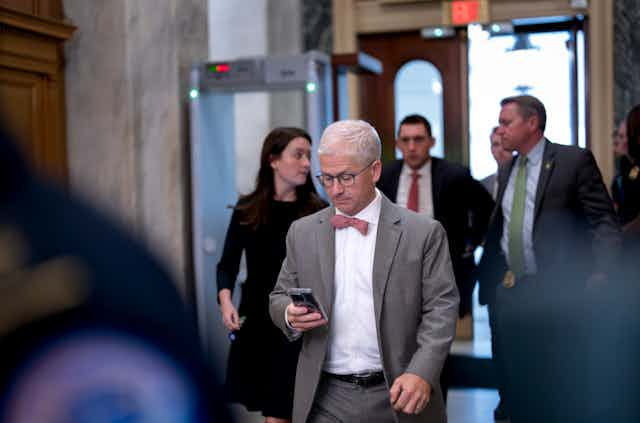In the wake of the Hamas surprise attacks on Israel, and that country’s resulting heavy military response, calls for Republicans in the U.S. House of Representatives to pick a new speaker quickly have grown, including from GOP members themselves. The absence of a speaker may slow or limit any aid the U.S. could provide to Israel.
The Conversation U.S. asked congressional scholar Laura Blessing, a senior fellow at Georgetown University’s Government Affairs Institute, to explain what a major crisis abroad has to do with internal divisions within one U.S. political party.
How has the violence in Israel and Gaza shifted the dynamics within the GOP around the speaker search?
Israel has strong support within Congress in general, and certainly among House Republicans and Republican voters. Both of the speaker candidates, Rep. Steve Scalise and Rep. Jim Jordan, have expressed their strong support for Israel. The attacks on Oct. 7, 2023, call attention to the leadership vacuum in the House and place more urgency on the speaker search.
Both parties have voiced concern about the situation in Congress. The notable exceptions have come from those who engineered the ouster of former Speaker Kevin McCarthy, including Matt Gaetz, who said, “I don’t think that other countries think about Kevin McCarthy’s speakership quite as much as Kevin McCarthy does.”
Some House Republicans have even suggested reinstating McCarthy, though apparently not at his direction.
The Republican chair of the House Foreign Affairs Committee, Michael McCaul, has strongly called for action on Israel, wanting a House statement of support even in the absence of a newly elected speaker. But the current consensus in Congress is that the power of the temporary speaker, Speaker Pro Tempore Patrick McHenry, is very limited, which creates more pressure for a new speaker to be elected. McHenry appears to agree with this consensus.
Jordan opposes Ukraine aid and supports larger appropriations cuts; he is seen as the populist, anti-establishment insurgent in contrast to Scalise’s establishment credentials. Both candidates support Israel.
But if Jordan were speaker, he would be expected to be more resistant to packaging support for Israel with other items, such as Ukraine aid, or the passage of appropriations generally. Scalise, by contrast, is expected to be far closer to the Kevin McCarthy mold of leadership.
But whether the higher stakes of the crisis in Israel prompt those in the Republican conference to reconsider their votes, enlist McCarthy again, or prompt a faster process is hard to tell in this fast moving and, for now, opaque process.
Initial tracking of support, from FiveThirtyEight journalist Nathan Rakich, for both Scalise and Jordan shows that neither candidate has a clear path to a win, that Jordan initially has more support, and that Scalise has the more establishment-minded members of the party backing him. But it took 15 votes and four days for McCarthy to win the speakership this January, even though no one mounted an organized, opposing candidacy.
What difference would it make if there were a House speaker already in place?
Initially, the Biden administration is accelerating delivery of aid the U.S. has already promised Israel, which receives more than US$3 billion in U.S. aid a year.
But when the administration wants more funding, which is very likely, it will need to go to Congress. The position of speaker would need to be filled for legislation to move forward. General congressional support for Israel may mean that proposal could more easily be coordinated with the Senate than other spending bills.

What can the House do with only a temporary speaker in office?
Nobody is really certain, and there are legitimate disagreements of how to interpret the powers of the speaker pro tempore. The bipartisan consensus of those in Congress, at least for now, is that McHenry can’t call up legislation, including the appropriations bills that would be needed to give additional funding to Israel.
The part of the House rules governing the interim speaker, Rule 1, Clause 8, is very much open to interpretation. Congress could have gone in a different direction and voted to interpret the position’s powers as more active, though that would have reduced pressure for a new speaker.
The possibility of even having this office of a temporary speaker was a precaution taken in the wake of 9/11, imagining that a speaker might somehow be incapacitated; it’s never been tested. McHenry and the Congress are making precedent with every new action.
How might different results in the speakership race affect the US positions toward Israel and Hamas?
Aid for Israel, as a stand-alone item, has strong bipartisan support in Congress and with both candidates for speaker. But it is hard to say how quickly a new speaker would be elected; certainly it could be a drawn-out process.
The White House has expressed interest in a combined aid package that includes assistance to both Israel and Ukraine. Many House Republicans oppose such a move, and a Jordan speakership would be expected to make negotiations with the Senate and White House more difficult in general, with a greater appetite for government shutdowns. Jordan voted against the recent stopgap spending measure that averted a government shutdown; Scalise voted for it.
The wider state of government funding will be far more difficult, with the appropriations process revealing strong partisan disagreement. Even typically bipartisan bills such as defense spending are very partisan after the inclusion of different socially conservative amendments in the House.
Ukraine funding is also in a difficult position, emerging more recently as a partisan flashpoint even though back in July most House Republicans supported aid to Ukraine. If funding for Israel becomes embroiled in other spending debates, agreement will become more difficult.
The lessons the House learns from deposing a speaker for the first time can also be consequential. Will members tire of the few in the hard-right flank who engineered McCarthy’s ouster, thus giving the incoming speaker more political capital, perhaps by eliminating the motion to vacate, with which a speaker can be ousted? Or will a very difficult governing situation become more so, as the next speaker continually looks over his shoulder? Much remains to be seen.

